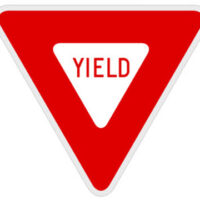Proving Fault in a Failure to Yield Accident

While we may like to think that everyone on the road is familiar with Florida’s traffic laws, the number of accidents occurring in the state indicate that this is unfortunately, not the case. Many drivers, for instance, are unfamiliar with the rules regarding who has the right-of-way and what that entails. To learn more about how these rules could affect your own chances at recovery, please call an experienced Fort Lauderdale auto accident lawyer today.
Who has the Right-of-Way?
The right-of-way is a term used to refer to the driver who has the right to proceed when one or more vehicles are trying to enter a road or are at an intersection at the same time. This term can, however, also be used when referring to a situation involving a pedestrian or bicyclist. Under Florida law, certain drivers, cyclists, or pedestrians have the right-of-way in specific situations and when someone fails to obey those rules, he or she can be held liable for any resulting accidents.
Common Right-of-Way Scenarios
Right-of-way questions tend to arise most often in discussions regarding four-way stop signs. In these cases, when one or more vehicles halt at different stop signs at the same time, it is the vehicle on the right who has the right-of-way, which means that the other vehicles will need to yield to that vehicle. Who has the right-of-way also comes up:
- At crosswalks, where vehicles are required to yield to pedestrians;
- At T-intersections, where vehicles entering a roadway must yield to vehicles that are already on the road, including vehicles traveling from one road to another and cars going from a parking lot or driveway to a roadway; and
- On freeways, where vehicles entering a freeway on-ramp must yield to those that are already on the road.
While some of these scenarios, notably those involving freeways, will have signs indicating who must yield to whom, this isn’t always the case. In those situations, it is the drivers who must have a thorough understanding of state and local traffic laws.
Liability for Right-of-Way Accidents
Proof that a driver didn’t obey the right-of-way rules can act as strong evidence that a driver is at-fault, and so can be held liable, for causing an accident. Demonstrating this can be achieved through the use of:
- Video recordings of the crash, either from nearby security cameras or traffic cameras;
- Eyewitness testimony of bystanders who saw the accident occur;
- Photographs of damage to the vehicles, which can indicate what direction the vehicles were traveling and at what speed; and
- Police reports, which will indicate whether any of the drivers at the scene of the accident were issued a citation for violating right-of-way traffic laws.
For help determining whether a failure to yield contributed to your own accident, please call our office today.
Was Your Accident the Result of a Failure to Yield?
If you were injured in an accident because another driver violated a traffic law, please call the dedicated car accident lawyers at Boone & Davis to learn more about how that violation could affect your own ability to recover compensation. Call us at 954-566-9919 or send us an online message today.
Resource:
flsenate.gov/Laws/Statutes/2011/0316.123
